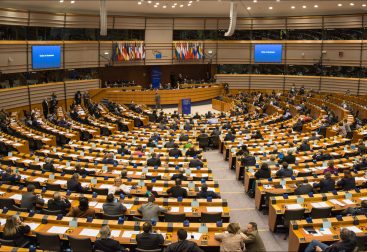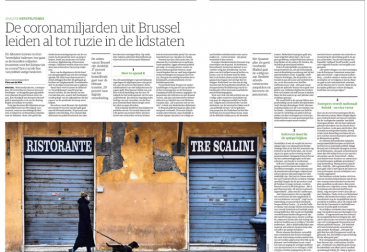This blog post is the short version of my proposal to use “enhanced cooperation” in the refugee crisis instead of a qualified majority vote and shows how a rarely used treaty provision could be applied in the current refugee crisis. A longer blog post was published by the Jacques Delors Institut – Berlin on 21 September 2015 and an op-ed appeared in the German daily Frankfurter Rundschau on 22 September 2015.
At the time of writing, the 28 EU Member States have failed to reach an agreement on the Commission plan for a mandatory quota to relocate 120.000 refugees. On 14 September 2015 the Justice and Home Affairs Council only endorsed an earlier plan for the relocation of 40.000 refugees to Member States on a voluntary basis. Although support for the plan seems to be rising, some central European Member States are still opposed to a mandatory quota.
Alongside another voluntary mechanism, only pushing through the proposal by a qualified majority vote is currently being discussed as an alternative strategy. Considering this option would put pressure on the quota opponents, but could refugees really be relocated to a Member State whose government rejected the quota?
An avant-garde for refugee policy could be legally possible
For cases in which Member States cannot reach an agreement, the EU treaties offer an escape route: If at least nine Member States are ready to cooperate beyond the status quo on a certain policy issue, Article 20 TEU contains the provision to establish “enhanced cooperation”. This provision is already being used in divorce law and on the unitary patent. The financial transactions tax will also be introduced on that basis.
According to the Treaties, Member States that want to establish stronger cooperation among themselves, are authorised to use the EU framework and its institutions, if their actions further the objectives of the Union, protect its interests and reinforce its integration process. At the same time, the treaty contains a number of safeguards for non-participating Member States that must be fulfilled: Any enhanced cooperation shall comply with the Treaties and EU law. Neither the internal market nor economic, social and territorial cohesion shall be distorted. Enhanced cooperation must also respect the competences, rights and obligations of those Member States, which do not participate in it. In addition, the provision shall only be used as a last resort, when it has been established by the Council that the objectives of such cooperation cannot be attained within a “reasonable period” by the Union as a whole.
Neither the Treaties nor the EU Court of the Justice have quantitatively defined this time period. Member States and EU institutions could take the current refugee crisis as an emergency situation and agree to take swift action and speed up the decision-making process.
The probability of legal challenges in Luxembourg is lower than internal market dossiers like patent law or the financial transactions tax. It is difficult to see who would raise the litigation in the first place. Member States remaining outside not have to fear suffering from negative externalities.
There are, however, three legal question marks:
First, the Commission, as the guardian of the Treaties, is under no obligation to follow a request by a group of Member States to establish enhanced cooperation. It could instead ask the Council to vote on its proposal and thus try to make sure that the Treaties are respected. But another issue is what would follow from such a clash of institutions.
Second, enhanced cooperation is really a “last resort mechanism” which was designed to be used when it is impossible to adopt a measure. From a legal point of view, the desire not to disappoint the minority is not a good reason to use enhanced cooperation as a last resort. Since the mandatory quota can be adopted by a qualified majority vote in the Council, from a purely legal point of view, such a vote should be taken.
And, third, all EU Member States are subject to the same human rights obligations under the refugee conventions. Pursuing enhanced cooperation might give the impression that refugee protection is not (or no longer) a common responsibility
Ambitious cooperation instead of unilateral action
Instead of unilateral actions of Member States that lead to the temporary reintroduction of border controls or to suspending rail services between Member States, the EU institutions (notably Commission and Parliament) and those Member States that are in favour of a mandatory quota for the relocation of refugees need to develop a sound bargaining strategy based on the basic rule of working together for a common solution. Proposing to use enhanced cooperation would be a bargaining chip that could send a dynamic signal to “unwilling” Member States: In the earlier cases of enhanced cooperation, the groups of Member States that had initially requested enhanced cooperation have been growing over time.
In the EU reaction to the refugee crisis, intergovernmentalist tendencies have prevailed and calls for unity, solidarity and the European common good have fallen unheeded. From that point of view, pursuing the path of enhanced cooperation would be beneficial in this situation, since it allows for Member States to choose a level of integration that corresponds to their preferences.
For the quota to relocate refugees, a more ambitious mechanism with fewer participating EU Member States based on Article 20 TEU, would be a more adequate response to the refugee crisis than no mechanism or a badly designed voluntary mechanism. Beyond the technical discussion in this paper, one should, however, not forget that this human crisis cannot be solved by using an arcane treaty provision.
Update 23/9/2015:
Proposal to use Enhanced Cooperation in the Refugee Crisis by @tineurope http://t.co/MFYHU7xY6I pic.twitter.com/kIGAKzbMy0
— Jacques Delors Centre (@DelorsBerlin) September 21, 2015
Great piece by @tineurope on the pros and cons of using #EU enhanced cooperation for refugees relocation quotas http://t.co/fALQusMDq0
— Renaud Thillaye (@RThillaye) September 22, 2015
How a rarely used treaty provision could be applied in the current #refugeecrisis (instead of #QMV) #EUCO #EuCouncil http://t.co/vmtq9UV5Ro
— Valentin Kreilinger (@tineurope) September 21, 2015
(Frankfurter Rundschau, 22. September 2015, page 10)




